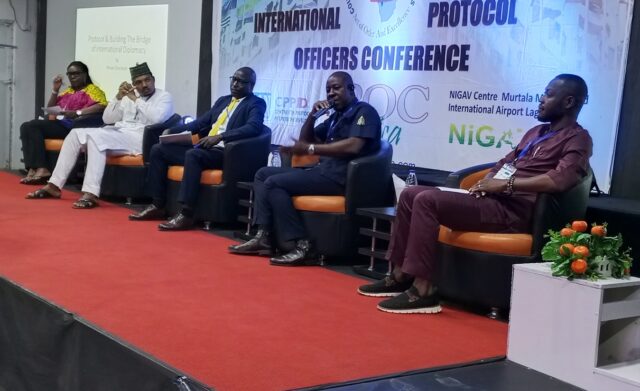
Nigeria’s protocol professionals gathered in Lagos for the 2025 International Protocol Officers Conference (IPOC) to examine emerging trends and challenges shaping the future of protocol management.
The five-day event, organised by the Centre for Protocol Professional Development (CPPD) and coordinated by Mr. Fortune Idu at the NIGAV Centre, Murtala Muhammed International Airport, Lagos, brought together practitioners from both government and private sectors.
The conference emphasised the need for Nigeria’s protocol professionals to move from a rules-based system to a more adaptable framework that can respond to rapid technological change, social pressures, and unpredictable global events.
Speaking during the opening ceremony, IPOC Africa Convener, Mr. Idu, described protocol as a “major tool for organising society” by maintaining structure through agreed rules and ethical standards.
“Protocol is often challenging given the continuously evolving international affairs from geopolitics and migration to crises, technology, and human factors,” he said.
“Its effects are felt in event planning, travel facilitation, personnel security, and resource management.”
He urged Nigeria’s protocol professionals to use the platform to acquire new crisis management and event coordination skills, stressing that protocol now extends beyond logistics to include strategic positioning for social and economic impact.
Mr. Idu added that the “increasing global interconnectedness” demands that protocol officers consider a wider range of cultural norms and expectations, especially during international events.
The conference featured paper presentations from Professor Olufunsho Suraj, UNESCO Coordinator Dr. Olunifesi Suraj, and television personality Mr. Patrick Doyle.
In his paper, Protocol Consultant, Mr. Moses Ekenimoh, examined “Protocol & Building the Bridge of International Diplomacy,” highlighting global trends, challenges, and practical lessons in official and diplomatic environments.
He said Nigeria’s protocol professionals must build trust, strengthen collaboration, and leverage networks to deliver effective services.
A panel session explored the impact of unruly passenger behaviour on protocol operations. Participants role-played real scenarios, identified challenges, and offered solutions to improve event coordination and travel facilitation was moderated by Nosa Aituamen of Radio Nigeria.
Another key speaker and facilitator is Ekelem Airhihen of the Federal Airports Authority of Nigeria (FAAN).
The gathering attracted representatives from the NNPC, European Union, ECOWAS Commission, Office of the Secretary to the Government of the Federation, Ministry of Solid Minerals, Arik Air, Aero Contractors, Corporate Affairs Commission, Nigeria Customs, RMRDC, Wema Bank, Oyo and Yobe State Governments, Nigeria Navy, and the Africa Aviation and Aerospace University, among others.
Delegates agreed that Nigeria’s protocol professionals must embrace innovation, adaptability, and continuous learning. They also stressed that protocol officers must anticipate disruptions and adopt strategic and tactical planning to ensure seamless event and travel management.
Ultimately, Nigeria’s protocol professionals resolved to advance from routine administrative tasks to becoming strategic enablers of diplomacy, corporate image, and national development.























